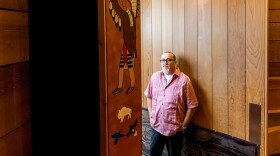Debra Stephens became chief justice of the Supreme Court of Washington — the state’s highest court — on Jan. 6. She’s been on the court since 2008, and is currently the only sitting justice from Eastern Washington.
We visited Chief Justice Stephens to talk about the law, being chief justice, and more. We aired this conversation during a special broadcast on Jan. 13, 2020, from the Temple of Justice, as part of our KNKX Connects reporting project.
Hear the conversation as it aired in the audio player above, or listen to an extended version through the player at the bottom of this page.
INTERVIEW HIGHLIGHTS
On seeking mentorship as the chief justice: “To be the chief justice is to be first among equals. And truly equals. We try to speak as one voice when possible. We debate. At the end of the day we take a vote on a lot of matters, and you stand up for the result of that vote. I’m finding tremendous wisdom I gain from those who have served in the chief justice role, and those who’ve served on the court a long time, but also from the colleagues who are junior to me. And what they bring to the court is tremendous. You don’t look up, you look in, because we really all work so collaboratively as a body of nine.”
On women’s status in the legal profession: “As more women come into the profession and overcome any number of barriers, it’s better for all the women who follow. I certainly benefitted from those who came before me. Some of the biggest challenges in the law profession are to families — to women who are mothers, to men who are fathers — because trying to find the work-life balance remains difficult. That’s not unique to law, but the legal profession is one of those where exhaustion is a status symbol. … But I think in terms of the number of women who are remaining in the profession and achieving leadership positions, it’s getting stronger and stronger every year, though it has lagged behind probably where all of us thought it would be 20 years ago.”
On being a first-generation college graduate: “One of the most important things all of us should be doing, starting with kids at a young age, is lifting them up, encouraging them about the talent they have. … A common feature among people who achieve higher education and launch their career is that several adults other than a parent had some impact on their life, whether it’s a coach or a music teacher, or a volunteer. I think that’s a responsibility I owe, but it’s also just a great joy. There are so many talented people who need to see themselves as the next chief justice.”
On making the law seem human: “Oh, I think the law is about humanity. It’s stories. It’s people’s real lives, and it may be one case of a dozen that a judge is going to hear in a day, but it may be the most important thing in the lives of the litigants in that case. If you don’t see the humanity in it, you’re missing the whole point.”
On disagreeing without being disagreeable: “In every phase of all of our lives, we’re in a moment where the tenor of debate can be pretty nasty, and the lines can be so sharply drawn. It’s hard to live your life in a world where it’s us and them, or this side or that side. What being in the law teaches anyone — but especially being on a collegial court such as this one — is you have to be able to hold an idea without necessarily embracing it, to see both sides of an argument, to try to come to a reasoned position you believe best reflects the outcome that is most consistent with the law and with justice. If that’s done in a respectful way, everybody is better for that.”
It’s the first day of the 2020 legislative session. Today, KNKX Connects to Olympia, bringing you stories about Washington’s capital and how citizens can influence the direction of their state government. As the Legislature convenes, we’re taking a closer look at what’s happening at the Capitol, and life in the city surrounding it. To listen to all our stories, visit knkx.org/connects.







